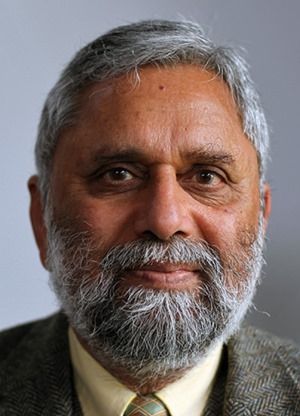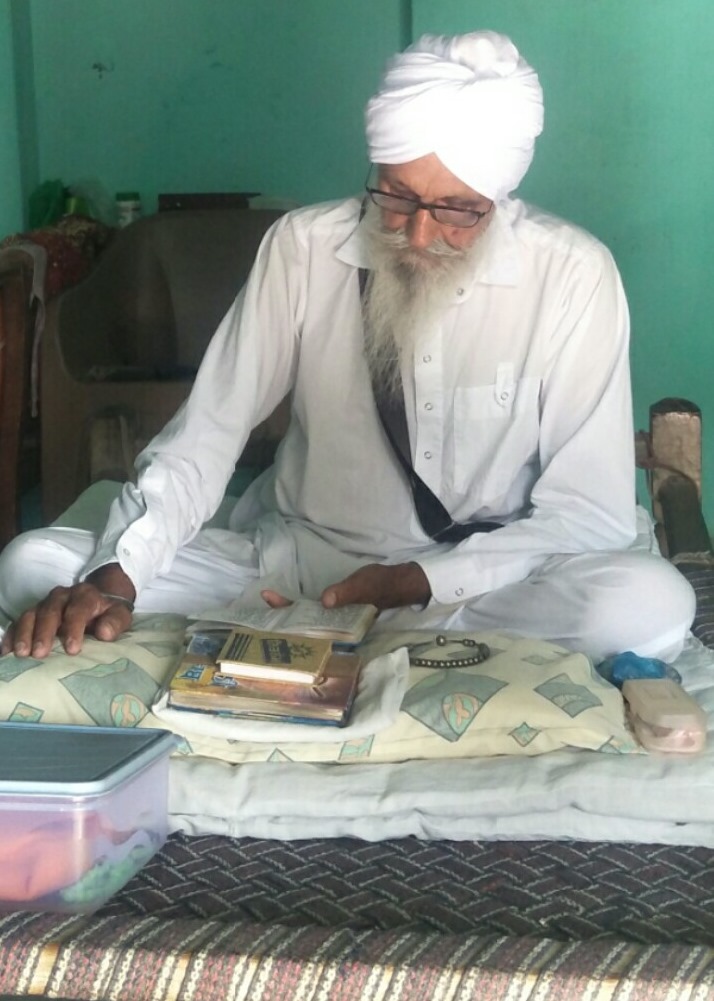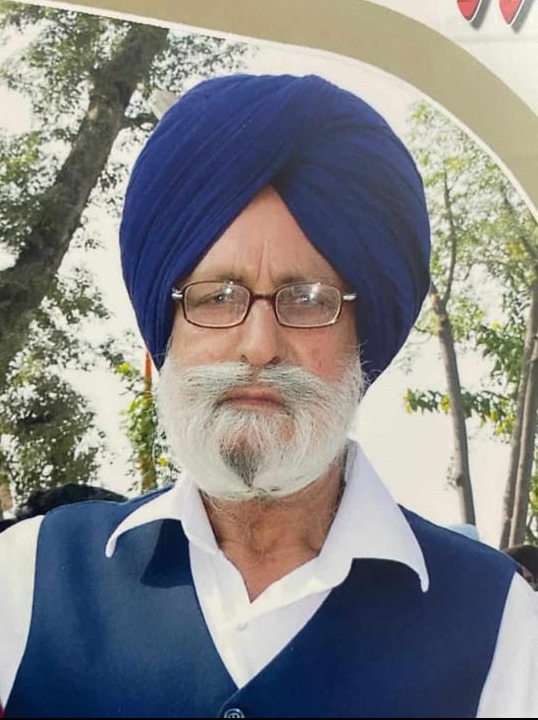| Serving
over 30 millions NRIs worldwide |
|
|||||||||||||||||||||||||||||
|
Los Angeles, Aug. 12, 2023 My brother’s life story- a history of rural Punjab
My dear and eldest brother S Gurnaib Singh Gill (85) passed away on July 30 at his home in Faridkot after fighting a brief battle with prostate cancer. The life story of my brother covers many shifts in the contemporary economic, social and cultural history of Punjab, especially its rural sector. We were a family of five brothers and five sisters. Our father had three sisters, but he was the only son of his parents. Being the eldest son of our parents and the eldest grandson of my grandparents, Bai Gurnaib became acutely conscious of his responsibilities to look after our grandparents, parents and his younger brothers and sisters at a relatively young age.Each of us (brothers and sisters) has stories of his protective role towards us. He took a deep interest in the education of all of us. I had the privilege of his special affection as I was his youngest brother for nearly 13 years until my younger brother was born. He was my mentor in many ways but especially in encouraging me to be physically fit. I now recall with astonishment that at the age of eight, I used to run nearly every day for two miles to prove to him that I was worthy of his affection.His encouragement instill the true meaning of education which further paves the way to agriculture research:Because he wanted me to study, he would not allow me to participate in any farming work to prevent me from acquiring any farming skills which might lead me to get interested in farming. Ironic as it may be that he became the chief and authentic source later of my primary level knowledge about many aspects of farming when I started doing academic research in agriculture. For my first research work (MA Honours School in Economics dissertation on Farm Size and Productivity- a crop-wise study of Haryana) while my teacher the late Prof G S Bhalla was the academic supervisor, Bai Gurnaib was the main primary source on the economics of different crops. Later on for my MPhil dissertation (Some aspects of labour use in Punjab agriculture) at Jawaharlal Nehru University under the supervision of Prof Krishna Bharadwaj, I relied upon Bai Gurnaib for getting to understand the nature of labour contracts that were used to employ agricultural workers as ‘siri’ (permanent labour) for a year and the difference of that kind of employment from casual labour employment.Being the eldest son, our father looked upon Bai Gurnaib as his chief companion in managing our ancestral land. As our family had land in two different villages, our father deputed him to take control of the entire farming operations in one of the villages at the age of 19. Though in today’s Punjab, it would certainly seem unthinkable for a young man of 19 years to assume the role of head of agricultural operations in a village that is not one’s native village, it was not a common thing even at that time in the late 1950s.Strong bonding with landless farmersRural life has many charms, but it is also full of jealousies and a variety of conflicts that vary from being very petty to life-threatening. Bai Gurnaib faced many challenges including ones which were life threatening because of jealousies from other landowners. The manner he devised to build alliances in the new village is illustrative of the caste and class dynamics in Punjab’s rural society. Knowing very well that he could not expect friendship from the landowners, Bai Gurnaib built bonds of strong friendship with landless farmers. I recall the names of Harnam, Harnek and Preetu, all agricultural labourers, who were not only his employees but fast friends. I had the first-hand experience of seeing that Jat Sikh-Mazhbi Sikh relations which many ill-informed writers on Punjab’s rural society describe only in confrontational terms are much more complex. The social and cultural modes of Bai Gurnaib’s friendships with his Mazhbi Sikh workers displayed strong signs of equality including sometimes eating and drinking together despite economic inequality between him and the agricultural workers. His experience had a formative influence on me in shaping my understanding of caste-class dynamics in Punjab’s rural society.Emotional attachment with his pair of Nagori bullocksHis relationship with animals especially with his pair of bullocks in the pre-tractorisation phase of Punjab agriculture had many dimensions of close human-animal relations. The animal power replacing mechanisation symbolised by the tractorisation phase has put an end to those relations. In that pre-tractorisation phase, our father bought a pair of Nagori bullocks from the famous Nagore cattle market in Rajasthan. The pair were expensive and very attractive looking. The word had spread around the surrounding villages about the beauty and strength of these Nagori bullocks and it led to a stream of farmers coming to our house to see these new entrants in the village society. Bai Gurnaib looked after his pair of bullocks so devotedly that a sort of deep emotional bond developed between him and the pair. The pair will respond actively to his commands in a way one would normally expect from human beings. The pair spent their whole life at our farm and when they died after becoming old and weak, it was a period of deep mourning for all family members but especially for Bai Gurnaib.Pain of change in the phase of agriculture with the advent of green revolution Some of the observations Gurnaib shared with me about the organic phase of Punjab agriculture and the industrial-chemical phase later have stayed with me. He told me that when chemical fertilizers and pesticides started being used with the advent of the so-called Green Revolution, it confused the farm birds so much that they mistook particles of fertilizers and pesticides as eatable seeds and died in large numbers after consuming those chemicals. He told me that the first time they used these chemicals and went the next day to the farm, they saw rows and rows of dead sparrows. This description of that ecological horror still haunts me. This disgusted him so much that he fell ill and even thought of abandoning farming. The logic of economic returns eventually prevailed and the results of environmental degradation in Punjab’s rural life are in front of us. Bai Gurnaib never forgot that a phase existed in Punjab agriculture once which was healthy for the land, people, animals and birds.
|
||||||||||||||||||||||
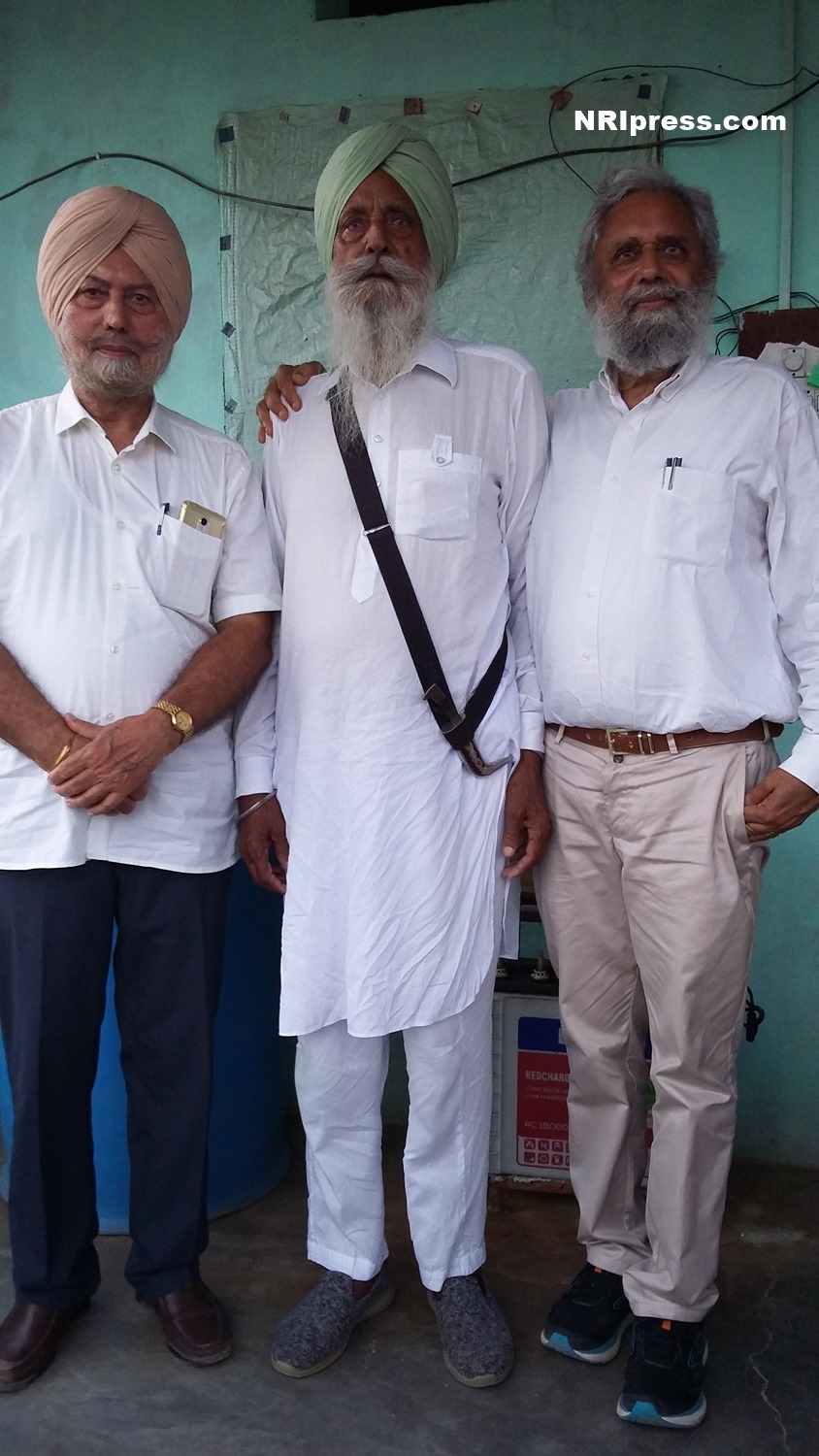 |
GurnaibSingh Gill
|
| With Gurnaib and Balwinder Sep 2022 |
BIO of Professor Pritam Singh:
| Professor Pritam Singh, Emeritus Professor of Economics, OXFORD, BROOKES. UNIVERSITY | |
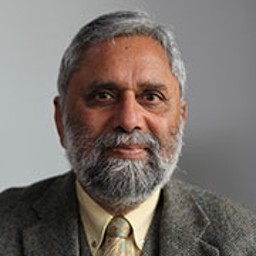 |
Professor Pritam Singh’s expertise are economics, environmental economics, comparative economic systems and competing economic paradigms.
|
EDUCATION:
2018: Awarded Emeritus Professor at Oxford Brookes UniversityPritam has a doctorate in economics from the University of Oxford (Oriel College) where he was awarded the Edward Boyle/Charles Wallace Scholarship.
- He took his BA Hons School in Economics and MA Hons School in Economics degrees from Panjab University, Chandigarh (India).
- He was awarded the Junior Research Fellowship by the University Grants Commission in India to study at Jawaharlal Nehru University, Delhi from where he passed his Mphil with distinction.
- Before coming to Oxford, he has taught at University of Delhi as a Lecturer in Economics and at Panjab University, Chandigarh as a Reader in Economics.
- In 2007, he was elected as a Research Associate at the Department of International Development, Queen Elizabeth House, University of Oxford
- He won internal funding to undertake two pedagogic research projects during 2006-07.
- In 2009, he was a Visiting Professor at Jawaharlal Nehru University, Delhi and in 2013 at Moscow State University, Moscow.
- He leads the research cluster on Environmental and Development Economics in the Department.
Professor Pritam Singh was:
- On the editorial board of Brookes eJournal of Teaching and Learning and the International Journal of Pluralism and Economics Education and has co-edited (with M Pearl) a book on pedagogic research (Equal Opportunities in the Curriculum, Oxford, 1999).
- On the Managing Committee of the Association for Heterodox Economics (UK) which endeavours to promote pluralism and diversity in economics teaching and research in the UK and abroad
- Invited to give the key note address at an international conference on Teaching Methodologies in India and Abroad at Baba Farid University, Bathinda, Punjab in India in January 2010 where he spoke on ‘Teaching methodogies: some lessons from the comparative experience of teaching in India and the UK'.
- An external advisor on the validation panels for economics and business degrees at Coventry University and the City University of Birmingham.
- Actively involved in doctoral student supervision as Director of Studies with having supervised three PhDs to successful completion and currently supervising as Director of Studies seven PhD students including one from Burgundy Business School, Dijon and one by publication route.
Pritam leads the research cluster on Environmental and Development Economics.
Pritam's work is currently focussed on two main areas:
- one, the sustainability implications of the spatial shift taking place in global capitalism,
- and two, Indian capitalism with emphasis on decentralisation and human rights and with special reference to Punjab.
Pritam Singh Gill wrote two books on Federalism, Nationalism and Development: India and the Punjab economy (London/New York: Routledge, 2008; Special Indian Reprint 2009), and Economy, Culture and Human Rights: Turbulence in Punjab, India and Beyond (Delhi: Three Essays Collective, 2010) have received critical acclaim as path breaking works of scholarship.
- Both the books are being translated in other languages.
His book Federalism, Nationalism and Development: India and the Punjab Economy brings together ground breaking methodological approaches and field level data to add new dimensions to the understanding of federal modes of governance and the development process, particularly in India.
As one reviewer (in Economic and Political Weekly) has commented, ‘The book is one of those rare academic publications which have the potential to make history'.
His Economy, Culture and Human Rights: Turbulence in Punjab, India and Beyond marshals diverse theory and evidence drawn from economics, political science, moral philosophy, and history to make a case for understanding human rights as intrinsically important rather than simply as a means to achieve a given set of economic and political goals.
This book was the subject of over half an hour TV interview with Pritam on Sky/Sikh Channel.
His edited books Punjabi Identity in a Global Context (with S Thandi) (Oxford University Press, 1999, Reprint 2015) and Equal Opportunities in the Curriculum (with M Pearl) (Oxford Brookes University, 1999) were pioneering works in their respective fields. His research articles and reviews have appeared in various journals includingCommonwealth and Comparative Politics, Contemporary South Asia, Economic and Political Weekly, International Journal of Green Economics, International Journal of Punjab Studies, Journal of Development Studies, Journal of Peasant Studies, Strategic Change: Briefings in Entrepreneurial Finance and Third World Quarterly.
-
Sources: Professor Pritam Singh’s email and OXFORD, BROOKES. UNIVERSITY’s Profile

